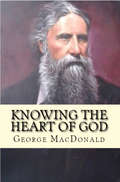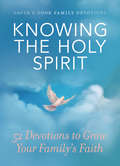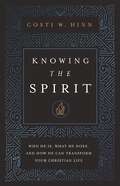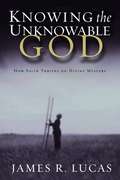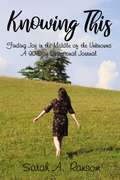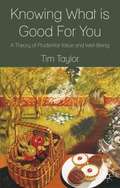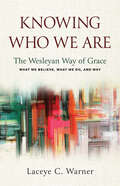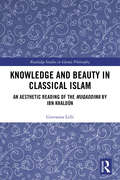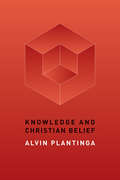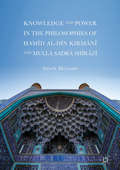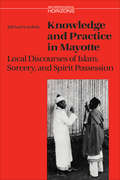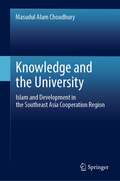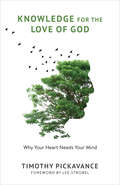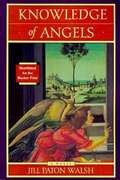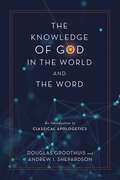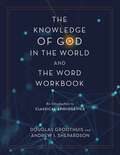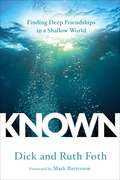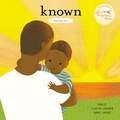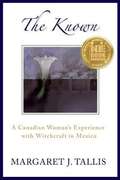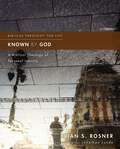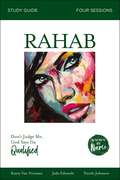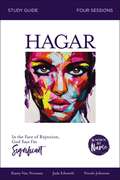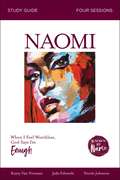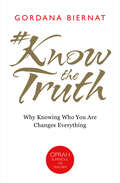- Table View
- List View
Knowing the Heart of God
by George MacDonaldThe editor of Discovering the Character of God presents further devotional selections from the poetry, sermons, and stories of George Macdonald. One of the nineteenth-century's greatest thinkers, George MacDonald has inspired generations with his fiction, nonfiction, and poetry. Now his words of wisdom are available in a series of devotionals compiled and edited by MacDonald scholar and biographer, Michael Phillips. Knowing the Heart of God presents brief, daily readings from MacDonald&’s poetry, sermons, and fiction. Each offers deep insight into God&’s love for humanity and his desire for us to love Him and each other. Readers looking for greater illumination along the Christian path will find it in this invaluable volume.
Knowing the Holy Spirit: 52 Devotions to Grow Your Family's Faith (David C Cook Family Devotions)
by David C CookThese devotions feature simplified doctrine with easy-to-understand language so children will be engaged and able to follow along. The theological depth of these devotions will strengthen parents’ faith as well, providing a growing experience for children and parents together. Each devotion features a section specifically for growing children’s faith, including a topic or question to start a conversation about spiritual matters, and a simple closing prayer. With illustrations highlighting key concepts, parents and children together will treasure time spent with these devotions as they grow closer to God and one another.
Knowing the Spirit: Who He Is, What He Does, and How He Can Transform Your Christian Life
by Costi W. HinnExplore what the Bible really says about the Holy Spirit and what it means to see the power of the Holy Spirit at work in your life.Whether intentionally or not, many Christians today seek health, wealth, and happiness by summoning the Holy Spirit like a genie to grant their wishes. When things don't go the way they think they should, disappointment and disillusionment abound. But it doesn't have to be this way.In Knowing the Spirit, author, pastor, and speaker Costi Hinn shows you why a relationship with the Holy Spirit is the most important next step on your journey as a Christian. Using clear and sound interpretation of Scripture, Costi clarifies who the Holy Spirit is--and who he isn't--and answers some of the most important and most frequently asked questions about him, such as:What does the Holy Spirit do?Does the Holy Spirit speak today?What is the baptism of the Holy Spirit?What are the gifts of the Holy Spirit?What does it mean to be filled with the Holy Spirit?What does it mean to walk by the Spirit?What is praying in the Spirit?And more! This book is only the beginning of your journey of knowing and loving the Holy Spirit. With the solid and biblical foundation presented in these pages, the Holy Spirit is someone you will confidently walk with every day for the rest of your life.
Knowing the Unknowable God: How Faith Thrives on Divine Mystery
by James R. LucasMeet the God Who Is Greater Than Your Biggest Questions. The Bible never shies away from seeming contradictions. We are told both to resist our enemies and to love them, and that our all-knowing God can sometimes forget. Unable to reconcile such biblical paradoxes, some people abandon Christianity, while others pretend that the seeming contradictions don’t exist–preferring to believe in an uncomplicated, easy-to-comprehend God. Yet countless others are hungry for new insight into the God behind the Bible’s mysterious paradoxes. Responding to this spiritual hunger, James Lucas delves into the mysteries of Scripture, demonstrating that biblical “contradictions” are actually exquisite paradoxes that enlarge our understanding of God. With this book as your guide, you can embrace the paradoxes of Scripture and pursue honest answers to your hardest questions. The study of biblical paradox leads to greater devotion to the majestic God who makes himself known even while he surpasses human understanding. Today, you can beginKnowing the Unknowable God.
Knowing This: Finding Joy in the Middle of the Unknowns A 90-Day Devotional Journal
by Sarah RansomIf you find yourself struggling to fill an empty hole in your heart and life, experiencing God will forever change your life. Our society and the culture of the world is changing almost faster than we can keep up. The things of life are continually pulling our attention in numerous directions. Our time is under constant restraint, we fight to squeeze in just the few things we enjoy amidst the busy of everyday life. We have to fight for relationships with our friends, our siblings, our parents, our spouses, our children, and even our God! Our beliefs in God are questioned and doubts of God&’s existence, goodness, mercy and love are constantly being thrown our way. We are scared to step out in faith because something bad might happen. It&’s easier to just stay quiet and &“go along with the flow&”. If you have ever found yourself wondering how faith, the Bible and God directly applies to life, you are invited to come and discover just how much God cares about YOUR life. We are created for relationship. Designed to be loved. We were made for God. Knowing This is a 90-day devotional journal that will take you on an adventure of discovering God on a more personal and intimate level. Each devotional comes from my personal quiet time that I have spent with my Heavenly Father. There are some real and raw moments and deep truths that God has shown me through the last few years. Every day is designed to encourage you to go and enjoy God&’s presence. Encourage you to experience Him! The daily devotionals include a passage of scripture, a personal challenge or life-lesson taught from that passage, some thought-provoking questions and a journal space to record your own journey, thoughts and experiences in your adventure to deeper intimacy with God.
Knowing What is Good for You: A Theory of Prudential Value and Well-Being
by Tim E. TaylorAn examination of the philosophical issues surrounding prudential value: what it is for something to be good for a person; and well-being: what it is for someone's life to go well. It critically analyses competing approaches, and proposes a new subjective account that addresses key weaknesses of existing theories.
Knowing Who We Are: The Wesleyan Way of Grace
by Laceye C. WarnerDiscover what sets United Methodism apart. In this book, Laceye C. Warner invites you to a richer understanding of Wesleyan Christianity so you can have a clear sense of identity, better express your own beliefs, and deepen your connection with The United Methodist Church. She introduces you to important values and characteristics that make the Wesleyan way distinctive, including emphasizing God’s grace for all and sanctification as tangible transformation in your life, your community, and all creation. You’ll see how The United Methodist Church today is deeply rooted in the Christian tradition and a legacy of care, compassion, and active response to injustice in the world. And you’ll find that Christian faith in the Wesleyan tradition holds together personal faith and community life, along with a commitment to justice through ministry and service. Pick up this book and study it with your small group and discover a way of being Christian that fills you with joy, moves you to follow Jesus wholeheartedly, and spurs you to live with compassion and grace. The book can be read alone or used by small groups anytime throughout the year. Components include video teaching sessions featuring Laceye Warner and a comprehensive Leader Guide, making this perfect as a six-week group study. A companion book, Who We Are and What We Believe: 50 Questions about The UMC, is also available.
Knowledge and Beauty in Classical Islam: An Aesthetic Reading of the Muqaddima by Ibn Khaldūn (Routledge Studies in Islamic Philosophy)
by Giovanna LelliThis volume offers an aesthetic reading of the Muqaddima by Ibn Khaldūn (d. 1406), a text that has been studied up to the present as a work on historiography. It argues that the Muqaddima is also a comprehensive treatise on classical Arab-Islamic culture and provides a picture of classical Arab-Islamic aesthetics in its totality. The theme of the book is the intrinsic connection between beauty and knowledge in the Muqaddima. Whenever Ibn Khaldūn deals with the problem of knowledge and science, he also deals with the problem of sensual beauty as an instrument or an obstacle to attain it. Ibn Khaldūn’s philosophy of history is necessarily also an aesthetics of history. His key-notion of “group feeling”, the physical, ethic and aesthetic virtue of Bedouin societies, is at once the origin of the ascent of centralised States and the cause of their ruin. It represents a tragic contradiction that applies to the history of the Maghreb but then takes a universal value. It reflects a range of other contradictions inherent to the "system" of classical Arab-Islamic aesthetics. These contradictions undermine the aesthetic system of the Muqaddima from within and provide decisive elements for the emergence of modern aesthetics. Offering a comparative approach, the volume is a key resource to scholars and students interested in Arabic and Islamic studies, philosophy, aesthetics and global history.
Knowledge and Christian Belief
by Alvin PlantingaIn his widely praised Warranted Christian Belief (Oxford, 2000) Alvin Plantinga discussed in great depth the question of the rationality, or sensibility, of Christian belief. In this book Plantinga presents the same ideas in a briefer, much more accessible fashion.Recognized worldwide as a leading Christian philosopher, Plantinga probes what exactly is meant by the claim that religious -- and specifically Christian -- belief is irrational and cannot sensibly be held. He argues that the criticisms of such well-known atheists as Richard Dawkins, Daniel Dennett, Sam Harris, and Christopher Hitchens are completely wrong. Finally, Plantinga addresses several potential “defeaters” to Christian belief -- pluralism, science, evil and suffering -- and shows how they fail to successfully defeat rational Christian belief.
Knowledge And Liberation: A Treatise On Philosophical Theology
by Nasir KhusrawNasir-i Khusraw was an Ismaili poet and theologian-philosopher of the Fatimid period. This treatise consists of a series of 30 questions and answers, and addresses some of the central theological and philosophical issues of his time, from the creation of the world to human free will.
Knowledge and Power in the Philosophies of Ḥamīd al-Dīn Kirmānī and Mullā Ṣadrā Shīrāzī
by Sayeh MeisamiThis book is a comparative study of two major Shīʿī thinkers Ḥamīd al-Dīn Kirmānī from the Fatimid Egypt and Mullā Ṣadrā from the Safavid Iran, demonstrating the mutual empowerment of discourses on knowledge formation and religio-political authority in certain Ismaʿili and Twelver contexts. The book investigates concepts, narratives, and arguments that have contributed to the generation and development of the discourse on the absolute authority of the imam and his representatives. To demonstrate this, key passages from primary texts in Arabic and Persian are translated and closely analyzed to highlight the synthesis of philosophical, Sufi, theological, and scriptural discourses. The book also discusses the discursive influence of Naṣīr al-Dīn Ṭūsī as a key to the transmission of Ismaʿili narratives of knowledge and authority to later Shīʿī philosophy and its continuation to modern and contemporary times particularly in the narrative of the guardianship of the jurist in the Islamic Republic of Iran.
Knowledge and Practice in Mayotte: Local Discourses of Islam, Sorcery and Spirit Possession
by Michael LambekOn the East African island of Mayotte, Islam co-exists with two other systems of understanding and interpreting the world around its inhabitants: cosmology and spirit-mediumship. In a witty, evocative style accessible to both the specialist and non-specialist reader, Michael Lambek provides a significant contribution to writing on African systems of thought, on local forms of religious and therapeutic practice, on social accountability, and on the place of explicit forms of knowledge in the analysis of non-western societies.The "objectified" textual knowledge characteristic of Islam and of cosmology is contrasted with the "embodied" knowledge of spirit possession. Lambek emphasizes the power and authority constituted by each discipline, as well as the challenge that each kind of knowledge presents to the others and their resolution in daily practice. "Disciplines" are defined as an organized body of practitioners or adepts, a concept precise and useful when applied to the contexts of Lambek's own research and equally so in the study of comparable environments elsewhere.Essential reading for those interested in the comparative study of Islamic societies, Lambek's argument directly contributes to the main anthropological arguments of the day concerning the social and cultural basis of systems of knowledge and ethnographic strategies for depicting them.
Knowledge and the University: Islam and Development in the Southeast Asia Cooperation Region
by Masudul Alam ChoudhuryThis book looks at a substantively new model of educational philosophy and its application within the field of tertiary education, in relation to socio-economic development in Southeast Asian members of the Organization of Islamic Conferences (OIC). Focusing on and drawing from the cross-regional South East Asian Cooperation (SEACO), a network promoting regional economic cooperation, the author presents a thoughtful evocation of a new orientation to educational philosophy and policy within the development context in the time of, and relating to, COVID-19. The generalized worldview of Islamic educational and socio-economic development model is laid down in relation to the philosophy of education and an ethical-scientific structure of development in terms of the theory of knowledge (epistemology, episteme). The foundation of scientific thought and a comparative Islamic worldview in understanding the unified reality of ‘everything’ is presented. The objectivity of socio-scientific learning at all levels of educational development is further explained within the context of SEACO and its think tank vis-à-vis a reconstructive perspective in which the Islamic episteme of the unity of knowledge and its substantive methodology is addressed and unpacked. The book is relevant to policymakers and scholarly researchers in Islamic philosophy and development and higher education in Southeast Asia and in the Muslim world and more broadly for the world of learning.
Knowledge for the Love of God: Why Your Heart Needs Your Mind
by Timothy PickavanceWhat is the role of the intellect in the life of faith? Jesus commanded us to love God with our minds—but why? Isn&’t simply believing enough? Confused on this point, many Christians choose to focus only on the role of their hearts in shaping their faith and consider that adequate. Some Christians go even further, arguing that knowledge exists in opposition to faith—that one must choose either the truth of science or the truth of the Bible. The reality is that our formation into Christlikeness relies heavily on our minds and that Christian belief is about thinking more, not less. Far from being a threat, the intellect is central to faith—so long as it is treated as an instrument of worship rather than as the object of worship. Knowledge for the Love of God is for followers of Jesus needing to better understand the crucial connection between faith and rationality. Timothy Pickavance shows how learning about who God is and what he has done, is doing, and will do draws us closer to him—just as in any relationship. With stories from his own experiences wrestling with this aspect of faith, Pickavance relates a compelling vision of how cultivating the intellect strengthens our Christian worldview, helps us gain freedom in Christ, and enables us to love God with our whole being. Discussion questions at the end of each chapter make this a book to be fruitfully shared among fellow believers desiring a deeper faith—one of heart, soul, strength, and mind.
Knowledge of Angels
by Jill Paton WalshAmara is abandoned as an infant, raised by wolves then captured by shepherds. She is sent to a convent where she becomes the object of an experiment to determine whether knowledge of God is innate. Palinor, an atheistic humanist prince and castaway seeks refuge on the island but is persecuted by the Catholic Church. Beneditx, a pious scholar, attempts to persuade Palinor that God exists. With the arrival of a special inquisitor from Rome, the clash between secular and conservative ecclesiastical values moves inexorably toward a gruesome climax.
The Knowledge of God in the World and the Word: An Introduction to Classical Apologetics
by Douglas Groothuis Andrew I. ShepardsonAmid the crisis of authority in our modern and postmodern era, Christians need to be able to point to God's revelation in the natural world in addition to defending God's unique revelation in the Bible and in the person of Jesus Christ.Classical apologetics takes a two-step approach to commending the Christian picture of reality. First, arguments for the existence of God, such as those of natural theology, are employed to create common ground with people outside the household of the Christian faith and to provide intellectual support for Christians. Second, classical apologetics defends key items of Christian revelation, including the reliability of the Bible, the identity of the historical Jesus, and the resurrection of Jesus Christ from the dead.In Knowledge of God in the World and the Word, authors Douglas Groothuis and Andrew Shepardson provide a simple introduction to classical apologetics that also addresses the most common objections to natural theology. Readers will discover in the book an easy point of entry into understanding why Christian beliefs about Jesus are true and rational. Further, the authors apply the power of classical apologetics to Christian ministry.
The Knowledge of God in the World and the Word Workbook: An Introduction to Classical Apologetics
by Douglas Groothuis Andrew I. ShepardsonAmid the crisis of authority in our modern and postmodern era, Christians need to be able to point to God's revelation in the natural world in addition to defending God's unique revelation in the Bible and in the person of Jesus Christ.Classical apologetics takes a two-step approach to commending the Christian picture of reality. First, arguments for the existence of God, such as those of natural theology, are employed to create common ground with people outside the household of the Christian faith and to provide intellectual support for Christians. Second, classical apologetics defends key items of Christian revelation, including the reliability of the Bible, the identity of the historical Jesus, and the resurrection of Jesus Christ from the dead.In the Knowledge of God in the World and the Word Workbook, designed to be used alongside the Knowledge of God in the World and the Word textbook by authors Douglas Groothuis and Andrew I. Shepardson, students are guided through learning exercises that introduce them to classical apologetics and to innovative defenses of natural theology.
Known: Finding Deep Friendships in a Shallow World
by Dick Foth Mark Batterson Ruth FothIn an often shallow and fast-paced world, how can we really know and be known by another person? How do we make true friends? The Digital Age is all about change, but the need for true friendship never changes. You are designed for real engagement with others---for affirmation that goes beyond a simple “like” on social media, for connection over meals, for hope and excitement about the future. Above all, you need to be known and accepted for who you are. But how do you find and maintain this kind of friendship in a fluid and frenetic culture? In Known, Dick and Ruth Foth offer inspiration and proven practices to build relationships through personal storytelling and affirmation. They draw on years of mentoring, rich relationships, and the model of Jesus to show you why friendship is one of the keys to a full life and the greatest gift we can give to each other.
Known: Psalm 139
by Sally Lloyd-JonesInspired by Psalm 139, Known's lyrical text reminds little ones that God sees them, knows them, and loves them more than they could ever imagine. Trust Sally Lloyd-Jones, the author of the bestselling The Jesus Storybook Bible, and Jago, award-winning illustrator, to encourage even the smallest believer and share God&’s love in this uplifting board book.Known shows children God sees them, He knows them, and He loves them – with a Never Stopping, Never Giving Up, Unbreaking, Always and Forever Love.Known is perfect for babies and infants ages 0 – 4 and features:lyrical text inspired by Psalm 139a reassuring message that reminds kids that God fully knows them and fully loves them, no matter what—a foundational truth to comfort and inspire childrenbeautiful, colorful illustrations that are a great gift for a new baby, First Communion, or birthday Look for additional inspirational children&’s books in the series inspired by The Jesus Storybook Bible:Near: Psalm 139Loved: The Lord&’s PrayerFound: Psalm 23
The Known: A Canadian Woman's Experience with Witchcraft in Mexico
by Margaret J. TallisMargie was an educated Canadian woman who married an educated Mexican man. If you would have mentioned "witchcraft" to her in those days, she would have laughed. They had a good life, remodeling a colonial house together, when her husband, an architect, started bringing home food from a woman's house. "How nice!" Margie thought. The woman, someone Margie never met, knew their favorite foods--Mexican as well as non-Mexican. Her husband had met the woman's son while singing in a church choir and took an interest in him. "So like Javier," Margie thought. He was a gentle man, always thinking of others. But soon after the food started arriving, Javier changed. He stayed out all night. His behavior became erratic. He became irresponsible and violent. Margie suspected an affair, alcohol, narcotics. But as his behavior became more and more unexplainable, so did hers. She saw wavy black lines in the air. She stared at flowers, mesmerized by their colors; she lost weight-her skin stretched tight against the framework of her face. And he, hallucinating, no longer in control of his mind, did not recognize her on the street. It was only a visit to a doctor that gave her the answer. She and her husband had been victims of poisoning and witchcraft.
Known by God: A Biblical Theology of Personal Identity (Biblical Theology for Life)
by Jonathan Lunde Brian S. RosnerWho are you? What defines you? What makes you, you?In the past an individual's identity was more predictable than it is today. Life's big questions were basically settled before you were born: where you'd live, what you'd do, the type of person you'd marry, your basic beliefs, and so on. Today personal identity is a do-it-yourself project. Constructing a stable and satisfying sense of self is hard amidst relationship breakdowns, the pace of modern life, the rise of social media, multiple careers, social mobility, and so on. Ours is a day of identity angst.Known by God is built on the observation that humans are inherently social beings; we know who we are in relation to others and by being known by them. If one of the universal desires of the self is to be known by others, being known by God as his children meets our deepest and lifelong need for recognition and gives us a secure identity. Rosner argues that rather than knowing ourselves, being known by God is the key to personal identity.He explores three biblical angles on the question of personal identity: being made in the image of God, being known by God and being in Christ. The notion of sonship is at the center - God gives us our identity as a parent who knows his child. Being known by him as his child gives our fleeting lives significance, provokes in us needed humility, supplies cheering comfort when things go wrong, and offers clear moral direction for living.X
Known by Name: Don’t Judge Me; God Says I’m Qualified (Known by Name)
by Kasey Van Norman Jada Edwards Nicole Johnson Karen Lee-ThorpThe women in the Bible asked the same three questions we all still ask today: How does everyone else see me? How do I see myself? How does God see me?Rahab’s story, found in the book of Joshua, is a story of a girl boss, an assertive, confident woman who did what she had to do to provide for her family. Her identity was shaped by her upbringing. With no Bible study to join or podcast to download, Rahab learned her beliefs and behaviors in a culture that believed in gods, not God. But when opportunity knocked, she boldly trusted in the God she had never known, and became something she never imagined–a woman who brought freedom to generations.This Bible study will take you through Rahab’s story as she trusted God’s final word about her worth above society’s. You will learn how to shed unhelpful labels and fears, and instead revel in God’s unconditional love and acceptance of you–just as you are. You can be free from shame and doubt.This study guide features video notes, group discussion questions, and between-session activities like reflecting on the drama and teachings, studying the character story in Scripture, memory verses, and journaling.Sessions include:Your Past Has a PurposeLiking Your ReflectionWhat’s in a ReputationYou Have a ChoiceDesigned for use with Known By Name: Rahab Video Study (9780310096344), sold separately.
Known by Name: In the Face of Rejection, God Says I’m Significant (Known by Name)
by Kasey Van Norman Jada Edwards Nicole Johnson Karen Lee-ThorpThe women in the Bible asked the same three questions we all still ask today: How does everyone else see me? How do I see myself? How does God see me?Hagar’s story, found in Genesis 16, is a story of cultural victimization. She was betrayed, abandoned, and scorned. Her response? She did what most of us would do when deeply hurt by someone we trust–she ran away. She got defensive. She retreated to a place where she felt safe. She felt justified in her anger and hurt. But deep in her core was a woman who longed to be seen and hoped for redemption.This Bible study will take you through Hagar’s story as she learns from hurt and heartache that what is unresolved is not unseen by God. The lack of finality in Hagar’s story teaches us to trust God with the ending–believing he sees us and he knows.This study guide features video notes, group discussion questions, and between-session activities like reflecting on the drama and teachings, studying the character story in Scripture, memory verses, and journaling.Sessions include:Exposing the Lie of ShameRejected to AcceptedTrusting after BetrayalTransformed and SeenDesigned for use with Known By Name: Hagar Video Study (9780310096498), sold separately.
Known by Name: When I Feel Worthless, God Says I’m Enough (Known by Name)
by Kasey Van Norman Jada Edwards Nicole Johnson Karen Lee-ThorpThe women in the Bible asked the same three questions we all still ask today: How does everyone else see me? How do I see myself? How does God see me?Naomi’s story, found in the book of Ruth, is a story of lost identity. She lost her husband and her sons, which in her culture left her completely without a home or a means to support herself. She was a Hebrew woman in Moabite territory, alone among strangers. She reacted by letting her circumstances define her. But even in her angry, fearful, rather dramatic season of feeling like the victim, God kept showing his faithfulness.This Bible study will take you through Naomi’s journey from comfort and security to despair and bitterness; from hopeless drifting to faithful obedience; and from loss to redemption in one short lifetime. We’ll learn that when we go through trauma, loss, and hardship, it’s normal to feel Just. So. Done. Yet God remains close. He is not done. He can and will redeem even in our darkest circumstances.This study guide features video notes, group discussion questions, and between-session activities like reflecting on the drama and teachings, studying the character story in Scripture, memory verses, and journaling.Sessions include:When Hard Times HitBehind the ScenesBetter than Being FixedFrom Bitter to BlessedDesigned for use with Known By Name: Naomi Video Study (9780310096597), sold separately.
#KnowTheTruth: Why Knowing Who You Are Changes Everything
by Gordana BiernatGORDANA BIERNAT is the only European to have been named an Oprah Winfrey SuperSoul 100 Teacher. Her straightforward and empowering tweets have already inspired hundreds of thousands across the globe and this book is a collection of her most profound wisdom. #KnowTheTruth will open your eyes to your true potential and inherent inner power; it will remind you of who you are and why you are here. All the 'truth thoughts' in this book have ONE purpose - to help you understand yourself and your place in the world. The truth is never complicated or irrational; the truth always feels easy and right. If you have an unresolved issue or need guidance, just ask, 'What is my message for today?' then open this book and read the message it has for you.
